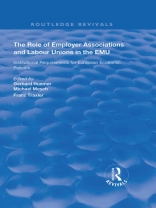First published in 1999, this volume recognises that in the course of European integration, national economic policy makers lose some effective policy instruments. Contributors to this omnibus volume analyse the ‘room for maneuvering’ available to national and EU economic and social policies under the conditions of the Economic and Monetary Union (EMU). They explore the possibilities for European coordination and discuss the tasks of employers’ associations and labour unions on the national and EU level in wage, employment and macroeconomic policies. Section 1 of the book deals with the strengths and weaknesses of the EU in the context of global competition. In spite of national differences, many of the EU member countries share important characteristics. Section 2 addresses the need for and the feasibility of policy coordination in the EMU. With the start of the EMU, wage policy will have to bear the main burden of absorbing asymmetrical economic shocks. The authors from the DIW argue that a wage policy favourable to economic growth, employment and convergence has to be guided by the inflation target set by the European Central Bank (ECB) and by the long-term increase of productivity in individual countries. A precondition for this kind of wage policy is coordination between the main actors of EU economic policy (ECB, Eco Fin, social partners).
Gerhard Huemer & Franz Traxler
Role of Employer Associations and Labour Unions in the EMU [PDF ebook]
Institutional Requirements for European Economic Policies
Role of Employer Associations and Labour Unions in the EMU [PDF ebook]
Institutional Requirements for European Economic Policies
Cumpărați această carte electronică și primiți încă 1 GRATUIT!
Limba Engleză ● Format PDF ● Pagini 221 ● ISBN 9780429767821 ● Editor Michael Mesch ● Editura Taylor and Francis ● Publicat 2018 ● Descărcabil 3 ori ● Valută EUR ● ID 6793650 ● Protecție împotriva copiilor Adobe DRM
Necesită un cititor de ebook capabil de DRM












